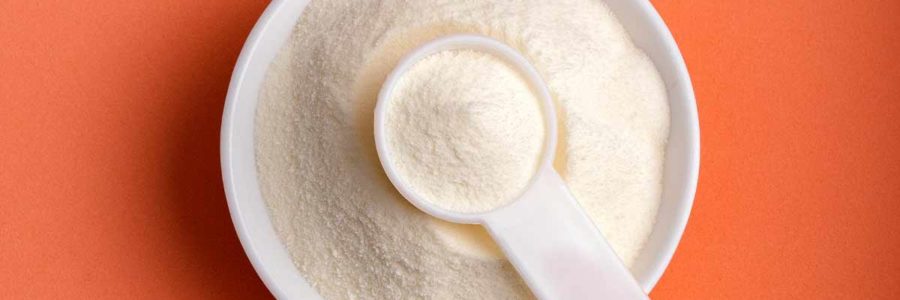What is the best collagen powder for hair, skin, joints, and other purposes? What about the best collagen supplement? And does collagen work? Learn more! What is the best collagen powder for hair, skin, joints, and other purposes? What about the best collagen supplement? And does collagen work? Learn more!
Collagen is the primary protein in the body’s connective tissues, making up approximately 25% to 35% of the protein in the body. The human body contains more collagen than any other type of protein. It is most abundant in bones, tissue, tendons, and skin. Collagen has many functions, including replacing and restoring dead skin cells and offering a layer of protection for the kidneys and other organs.
Best Overall: Great Lakes Collagen Hydrolysate
Best for Hair: Vital Proteins Collagen Peptides
Best for Muscle Support: Collagen MB
Best Supplement for Support: Systemic Formulas JOT
1. Best Overall: Great Lakes Collagen Hydrolysate
Great Lakes Collagen Hydrolysate is considered the best collagen supplement for several reasons:
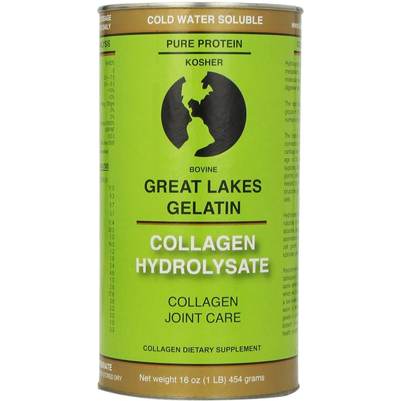
- It is an easier way to consume collagen, making it ideal for those with busy, hectic lifestyles.
- It contains hydrolysate collagen powder, providing the body with many nutrients and amino acids that tend to decrease as a person ages.
- It is derived exclusively from grass-fed and Pasture-raised cattle from Brazil and Argentina.
What is Hydrolyzed Collagen?
Also known as collagen hydrolysate, hydrolyzed collagen is collagen that has been created via hydrolysis: the process where water molecules rupture the chemical bonds of the collagen obtained from cowhides and fish scales. Hydrogen collagen is rich in nutrients, containing 20 amino acids and higher amounts of proline and glycine.
Not all collagen is created equal. For example, many collagen products may not contain all the various types of collagen, such as Hydrolyzed Chicken, Eggshell Membrane, Avian Sternum Collagen Bovine, and Pure Hydrolyzed Marine Collagen. Hydrolyzed collagen is easier to absorb than regular collagen and is GMO-free. Many collagens contain GMOs, while hydrolyzed collagen such as the Great Lakes Collagen Hydrolysate is natural and free of these genetically modified organisms.
2. Best for Hair: Vital Proteins, Collagen Peptides
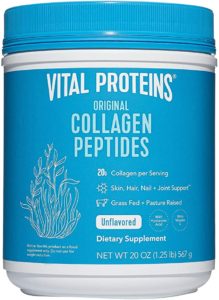
Vital Protein Collagen Peptides are considered the best collagen for hair because they contain amino acids identical to the protein found in hair, nails, joints, cartilage, and bones. This product is 100% pure, gluten-free, rBGH free, and contains no GMOs. This powerful combination of benefits and lack of harmful ingredients makes it an excellent choice for hair care.
What are Collagen Peptides?
Collagen peptides are small pieces of collagen that have been broken up into powdered form. This improves collagen absorption, allowing it to be readily used in the body, increasing structural tissues and collagen protein levels. Collagen peptides are also used for brittle bones, aging skin, muscle strength, and bone strength.
3. Best for Muscle Support: Collagen MB
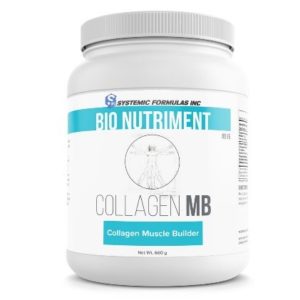
Vital Proteins Collagen Peptides is the best choice for muscle support, thanks to its specific tissue and muscle connective collagen peptides. These peptides are rich in cellular building blocks, branch-chain amino acids, immune support, and medium-chain fatty acids. This combination is essential during phases of rapid growth. Collagen peptide promotes lean muscle mass, flexibility, and improved health at the cellular level. This revolutionary product is specifically designed to deliver balanced muscle tissue support and sustained cellular energy.
4. Best for Joints: Collagen ECM
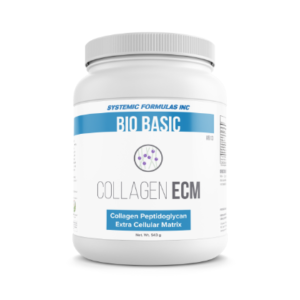
Collagen ECM is comprised of the most complete and powerful collagen formula. It also contains the following:
- Type I: Skin, tendons, bones, organs, and vascular ligatures
- Type II: Cartilage
- Type III: Reticulate fibers (fibers that support connective tissue durability and strength via crosslinks)
- Type IV: Basement membrane strength (matrix and skin support on extracellular level)
- Type V: Stimulates and supports cell structure strength, placenta integrity, and hair health
- Type X: Articular(joint) cartilage support
This product also contains two important ingredients: Amino acids and hyaluronic acid. The amino acid chains provide the specific molecules the body needs to maintain overall structural and functional integrity. Hyaluronic acid supports the body’s youthful cell maintenance and collagen synthesis processes.
How Does Collagen Support Joints?
Collagen helps keep bones strong. It also allows joints in the knees, hips, and shoulders to move fluidly. Without cartilage, movement in these and other joints would be painful and more difficult. Studies on collagen and joint health have yielded the following findings:
Athletes and joint pain. A 24-week study on 147 athletes with joint pain found that athletes treated with dietary collagen hydrolysate experienced several reduced parameters (such as joint pain) that hurt performance.1
Joint disorders. Collagen hydrolysate has been used to treat degenerative joint diseases. Studies indicate collagen hydrolysate consumed orally is absorbed intestinally and accumulates in cartilage. Researchers believe these findings indicate collagen hydrolysate can help individuals suffering from joint disorders such as osteoarthritis.2
Cartilage degradation and Type II collagen. A study on patients with knee osteoarthritis saw one group received acetaminophen while the other group received both acetaminophen and oral native type II collagen. After three months, the group receiving acetaminophen and oral native type II collagen saw “a significant difference in VAS walking score” compared to those who only received acetaminophen. Researchers concluded the combined treatment was “superior to acetaminophen for symptomatic treatment of patients with knee osteoarthritis.” 3
5. Best Supplement for Support: Systemic Formulas JOT
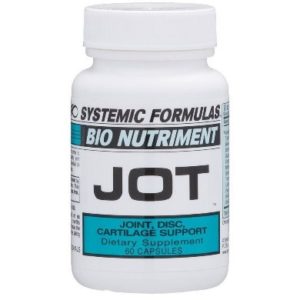
Even though JOT by Systemic Formulas is not a collagen supplement per se, it can be combined with a diet that includes collagen powder. This product supports healthy joint function and the joints’ comfort, mobility, and lubrication. Turmeric, L-Arginine, Bromelain Leucine, and other natural products are added to help relieve joint discomfort and promote the proper formation of joints, cartilage, and discs.
Collagen Supplements vs. Collagen Powder
Supplements that come in pill form are simply capsules containing hydrolyzed collagen powder. The capsule itself is made from cellulose, which is a plant protein. When consumed, the capsule disintegrates in the stomach, allowing the collagen to be used by the body. This is the same type of powder used in a collagen powder supplement. A collagen supplement or a collagen powder depends on individual choice and preference. Both products will yield similar results.
Does Collagen Powder Really Work?
The body naturally produces collagen, but production may decrease by 1% yearly. Collagen supplements help compensate for this reduction. For example, collagen powder is consumed to restore bones, tendons, cartilage, and fingernails. Others consume collagen powder to help reduce wrinkles by making the skin smooth, taught, and supple.
Studies indicate the promising benefits of collagen powder supplements:
A German study found that women who consumed a collagen supplement significantly improved skin hydration, elasticity, roughness, and density.4 Another study on collagen found it reduces skin wrinkles and positively affects dermal matrix synthesis.5
Thanks to its many scientifically backed benefits, collagen supplements may be a viable option to consider for improved skin, joint, and bone health.
References
- Kristine L Clark 1, Wayne Sebastianelli, Klaus R Flechsenhar, (et al). 24-Week Study on the Use of Collagen Hydrolysate as a Dietary Supplement in Athletes With Activity-Related Joint Pain. Randomized Controlled Trial Curr Med Res Opin. 2008 May;24(5):1485-96. doi: 10.1185/030079908×291967. Epub 2008 Apr 15. [PMID: 18416885] DOI: 10.1185/030079908×291967https://pubmed.ncbi.nlm.nih.gov/18416885/
- Alfonso E Bello 1, Steffen Oesser. Collagen Hydrolysate for the Treatment of Osteoarthritis and Other Joint Disorders: A Review of the Literature. Curr Med Res Opin. 2006 Nov;22(11):2221-32. doi: 10.1185/030079906X148373. [PMID: 17076983] DOI: 10.1185/030079906X148373.https://pubmed.ncbi.nlm.nih.gov/17076983/
- Fulya Bakilan, Onur Armagan, Merih Ozgen, (et al). Effects of Native Type II Collagen Treatment on Knee Osteoarthritis: A Randomized Controlled Trial. Eurasian J Med. 2016 Jun; 48(2): 95–101. doi: 10.5152/eurasianjmed.2015.15030. PMCID: PMC4970562. PMID: 27551171https://www.ncbi.nlm.nih.gov/pmc/articles/PMC4970562/
- Liane Bolke 1, Gerrit Schlippe 2, Joachim Gerß (et al.) Nutrients. 2019 Oct 17;11(10):2494. doi: 10.3390/nu11102494. [PMID: 31627309] PMCID: PMC6835901 DOI: 10.3390/nu11102494https://pubmed.ncbi.nlm.nih.gov/31627309/
- E Proksch 1, M Schunck, V Zague, (et al). Oral Intake of Specific Bioactive Collagen Peptides Reduces Skin Wrinkles and Increases Dermal Matrix Synthesis. Skin Pharmacol Physiol. 2014;27(3):113-9. doi: 10.1159/000355523. Epub 2013 Dec 24. PMID: 24401291 DOI: 10.1159/000355523.https://pubmed.ncbi.nlm.nih.gov/24401291/


